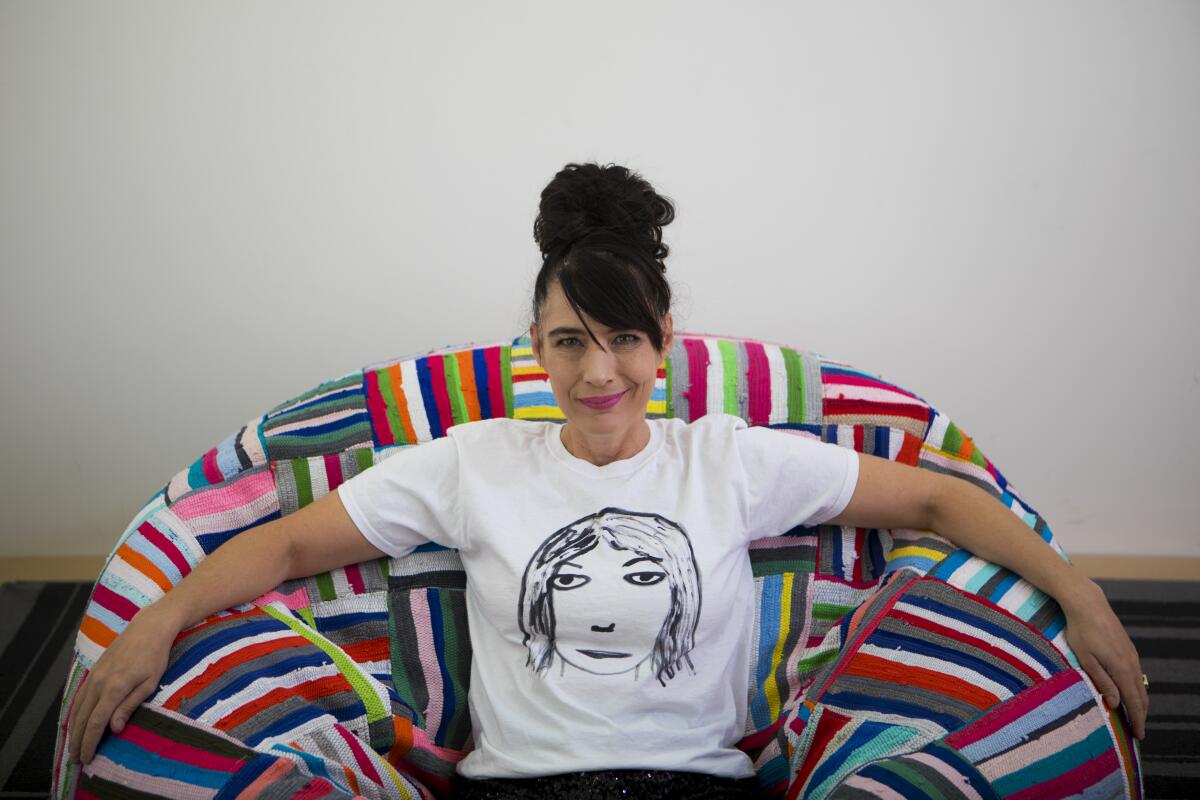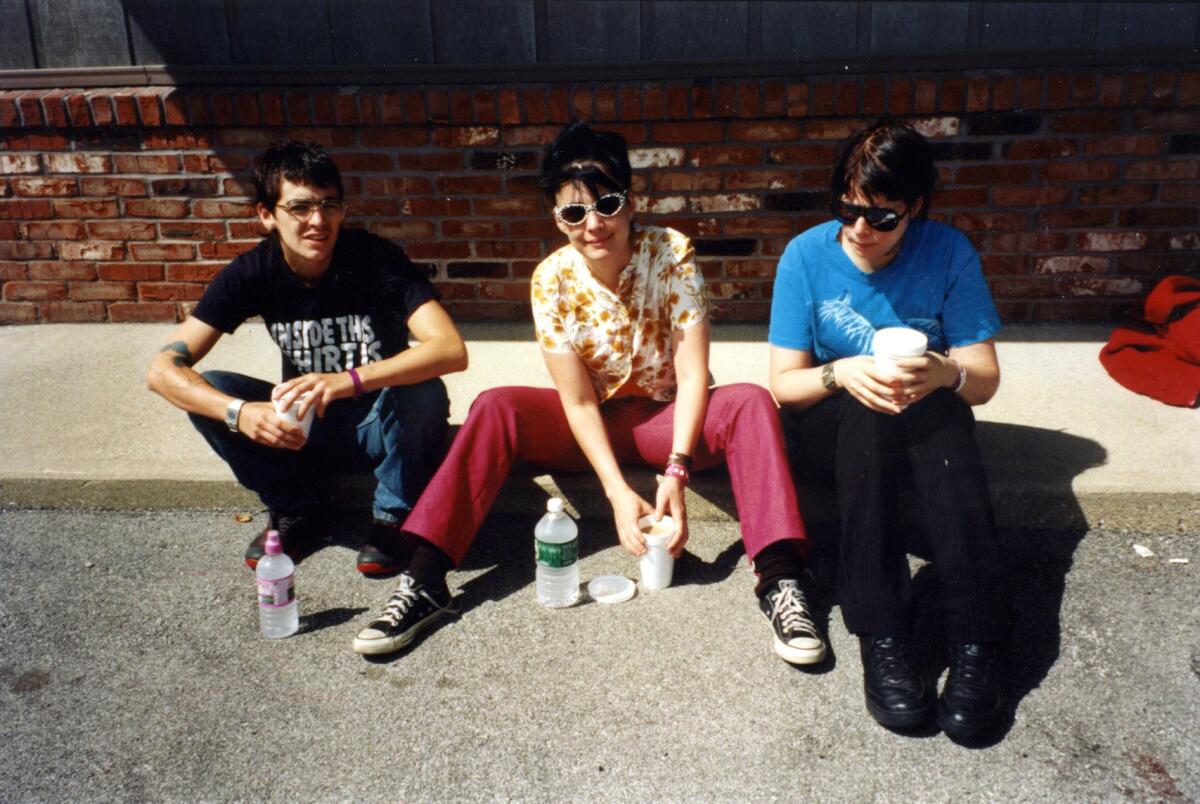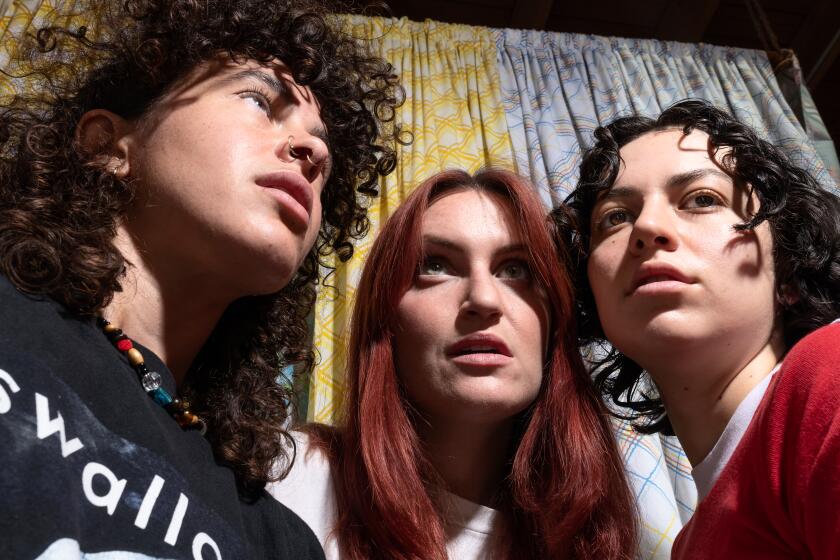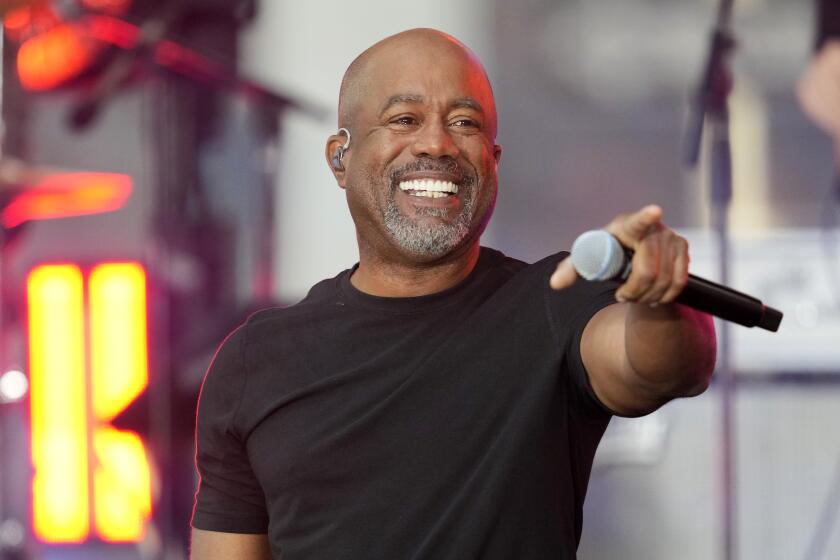Kathleen Hanna on the return of Le Tigre, ‘gross’ fans who won’t mask up and the summer of Beyoncé

Never one known for her eagerness to submit to interviews, Kathleen Hanna was happy, she admitted on a recent afternoon, to be talking to anybody at all.
The veteran punk singer and activist had just completed a 10-day stint isolating in a Maryland hotel room after contracting COVID while on the road with Bikini Kill, the foundational riot grrrl band that galvanized a generation with its radical-feminist anthems — and famously shunned most media beyond underground fanzines — then broke up in 1997 before reuniting three years ago.
Now, with Hanna, 53, due to fly to Poland the next day for another string of Bikini Kill dates, the singer was on Zoom from her home in Pasadena to discuss a second comeback: that of Le Tigre, the sly electro-punk trio she formed in New York in 1998 with Johanna Fateman and Sadie Benning (who was later replaced by JD Samson).
“I’ve been so f—ing bored,” Hanna said with a laugh of her time in quarantine. “So, yeah — lovely to chat with you.”
From country to disco, Newton-John sounded persuasive in a variety of settings, her voice providing a sultry undercurrent to her songs’ gentle promises.
This month Le Tigre will play its first show in over a decade as part of This Ain’t No Picnic, a two-day music festival set for Aug. 27 and 28 at Brookside at the Rose Bowl that will also feature LCD Soundsystem, the Strokes, Phoebe Bridgers and Beach House, among other acts.
A kind of bridge between New York’s electroclash and garage-revival scenes, Le Tigre layered fuzzy guitars and shouty vocals over chunky drum-machine beats in songs about queer visibility and institutional misogyny. The band, which released three LPs, wasn’t as impactful as Bikini Kill, whose classic “Rebel Girl” has been covered by both the Linda Lindas and Miley Cyrus. But it proved enduringly influential among DIY synth heads, and its pop smarts even led to a major-label deal for the group’s 2004 album, “This Island.”
Hanna, who’s married to Adam “Ad-Rock” Horovitz of the Beastie Boys and who recovered a few years ago from Lyme disease, talked about the band’s reunion, its legacy and touring in the age of COVID.

Why get Le Tigre back together?
Basically because I started playing with Bikini Kill again and was finally having fun singing. My health is so much better and my technical skills are way better. When I was playing with the Julie Ruin, which was the last project I did before getting back together with Bikini Kill, I was still really sick and kept having to cancel stuff. I was battling my illness to get onstage, and it just was not fun. It was a little bit of faking it. I remember playing a really bad show in Paris with Le Tigre. So now I’m like, I need to play Paris again and have it be a good show. It’s literally something that will keep me awake.
You’ve played — what? — thousands of shows in your life. But this one crummy gig sticks in your mind?
I’ve gone through a lot of permutations as a performer. When I first got into being onstage, a lot of it was: I didn’t get love as a child, and I was looking for love in all the wrong places. I wanted anonymous strangers to applaud me. That was the difference between Bikini Kill and Le Tigre. In Le Tigre it was about me outperforming myself rather than pleasing the audience. I wasn’t looking for them to validate me. I knew what I was doing was good. So when I say I need to go back to Paris and fix it, it’s not because I give a s— that Paris hates me. It’s that I know I didn’t do my best.

Say more about rediscovering the joy of singing.
With Bikini Kill at first I was like, There’s no way I can still sing like that — I’m too old. But then I got into the flow. We played the Greek Theatre [in April] and I felt like I was flying. All of the stuff that’s been pent up in me, it was like I was shaking all the demons out of my body. I feel like I just did a year of therapy from 10 shows.
What have you learned about your old songs by going back to them?
They’re catchy! Why does everybody always say we’re activists, not musicians? These are real songs. I get them in my head when I’m not on tour — and not in a bad Spin Doctors way. What’s been coming up with me performing live again is how often our musicality gets diminished. Is that a sexist thing, or does it happen to all bands? I don’t see people talking about Tame Impala the same way they talk about my projects.
I mention Tame Impala because I was just in the car and I was trying to listen to the Beyoncé record and Spotify kept switching to this playlist of MGMT and Tame Impala — all the indie hits of the 2000s. And it was all men. The only women on the playlist were, like, the two women in Arcade Fire. So I started having a contest to see how long I could listen before I heard a woman’s voice. Then I was like, Wait, this is keeping me from listening to Beyoncé.
Talk about Le Tigre’s decision to leave Mr. Lady, a tiny indie, and sign to Universal. These days nobody has any anxiety about that kind of move, but people worried about it back then.
Mr. Lady was wonderful, they just weren’t equipped to deal with a band of our size. So eventually you get to the point where you’re paying for all your own recording because the label just doesn’t have the money to do it. My whole career I would earn money from one band, put anything I could aside, and then I’d spend it all on the next band. And then I’d end up broke. I married somebody with money, so it’s totally different now. But in Le Tigre, after I spent all my money on the first record, I was like, I can’t keep doing this — I can’t raise $8,000 to make another album, which is how much it cost, and then cross my fingers that I’m gonna get it back.

What do you think of “This Island” now?
A lot of people disliked it, but when I listen to it I’m really happy with it. I mean, not all of it. But there are great songs on there: “On the Verge,” “TKO.” We always considered ourselves a conceptual art band. And so part of the art of that record was: What happens when three f—ed-up feminists get on a major label?
So what happened?
I remember one meeting where we were like, “Are you guys gonna put any marketing money behind what we’re doing? Is that what happens?” We were newbies in terms of all that. And they were just like, “Well, we’ve decided to put our marketing money behind JoJo’s new record.” Not JoJo Siwa — JoJo who had that song where she was all, “Get out!” I was like, “Ooookaaaay.” But, I mean, we already knew. We were all in our 30s. The fact that a major label was even interested in three women who weren’t 18 was kind of amazing.
The L.A. band overcame intra-band romantic entanglements and being dropped by its label to make one of the summer’s breakout albums.
Do you think Le Tigre’s sense of humor will come across to a Gen Z audience?
Yeah, but I think even more than that, sincerity is back. That was one really big earmark of us: We could be funny and sarcastic, but we were also just trying to make something positive in a really negative landscape. Part of the reason we weren’t considered a New York band is maybe that we didn’t have the veneer of coolness. There’s all these books and films and whatever coming out about the New York sound, and we’re never mentioned. We’re always the mashed potatoes, and they’re the steak.
You’re talking about the early-2000s moment with the Strokes and LCD Soundsystem and the Yeah Yeah Yeahs.
Which is weird, because James Murphy [of LCD Soundsystem], one of the first big things he ever did was a remix of [Le Tigre’s] “Deceptacon.” We were all hanging out. James stayed at our apartment and we spent time at his studio. We were breathing the same musical air. No one ever calls them Le Tigre for men, but we’re wannabe LCD Soundsystem feminists? That’s the placement it feels like we get.
Those other acts projected a very different image than Le Tigre.
We were f—ing dorks. We wore kooky costumes. We did dumb-ass dances. And we spoke directly in the mic to people. We weren’t trying to be a band of rock stars where people felt like we were a thousand miles away and they could never be us. We wanted people to see themselves in us. And I feel like people are receptive to that now because everything’s gotten so shiny and fake. People are going back to craft, people are going back to vinyl. We had a song where we labeled ourselves the New Sincerity, and now there’s articles coming out about the New Sincerity.

When Bikini Kill reunited, it was impossible not to think about how relevant the band’s songs about sexual assault still felt. Is the same true for you of Le Tigre’s songs?
Definitely, which is horrifying.
Have you felt inspired to write new songs about what’s going on right now? “Don’t Say Gay,” the overturning of Roe v. Wade and so on.
I’m in another band that hasn’t recorded or played live yet, and I’m writing for them. But so much of my life now is taken up singing about political stuff. In Le Tigre and Bikini Kill we’re singing about the after-effects of rape and domestic violence. We’re singing about queer visibility and how sometimes the visibility feels invisible-izing, if that makes sense. Like, what happens when the visibility lets people think, Oh, it’s all solved? I know as a feminist, the more pictures of me there are and the more interviews I do that just get cut up to get clicks — it actually feels like I get smaller. That’s why I hate doing press.
Did getting COVID on tour make you rethink being on the road?
I shouldn’t be going back out tomorrow. But there’s not that much left to go. So we’re just gonna try and muddle through and see what happens. I want to play the shows. And if it weren’t for mask mandates being struck down and people not being respectful, it might be OK. I don’t like playing shows knowing that the people who like Le Tigre who want to come see us who don’t feel comfortable being in a crowded situation — I don’t like feeling like I’m not catering to them. That feels horrible. But I can’t make mandates on my own.
Has the resistance to masks made you think about your audience in a different way?
Yeah. It’s weird to get emails and messages that are like, “You saved my life,” then go to a show and kindly ask that the front row masks up and they won’t. I was thanking everybody recently who did and this guy in the front row pulled his mask down and flipped me off.
It’s just capitalism — the whole American rugged-individualist thing. “My body, my choice,” unless it’s abortion, of course. It’s gross, and it’s disheartening to see that’s a part of our fan base. But it is. I’ve also seen white women yelling at men of color for being in the front, and that’s very discouraging. I’ve seen white women being racist a— at our shows in a variety of ways. I call it out when I see it. People always say, “You’re just preaching to the converted.” No, we’re not.
More to Read
The biggest entertainment stories
Get our big stories about Hollywood, film, television, music, arts, culture and more right in your inbox as soon as they publish.
You may occasionally receive promotional content from the Los Angeles Times.













